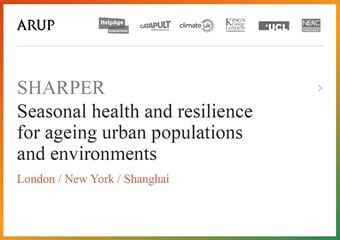Most climate change impacts in cities will be felt through the increase of extreme weather events such as heatwaves and floods. Heatwaves such the ones experienced in London over the last two decades and hurricanes like Sandy which caused significant damage in New York City in 2012 are projected to occur more often and be more intense.
People living in cities currently represent 54% of the total world population compared to 34% in 1960. Alongside this continued urbanisation, the world population is ageing rapidly. People aged 65 and older are expected to make up 22% of the total world population by 2050. The number of people aged 80 and older will also quadruple by 2050. These combined trends mean that more people will be exposed and vulnerable to climate change impacts in cities in the future.
This report focuses on how these global trends are affecting London, New York and Shanghai. It addresses the exposure and vulnerability of the ageing populations in cities to extreme weather events and has developed a new Heat Vulnerability Index for London.
A range of measures have been identified to reduce the vulnerability of elderly people and to inform policy and practice relevant to creating healthy and resilient cities. The report suggests that ‘win-win’ measures which increase the resilience of elderly people while contributing to wider sustainability and resilience benefits for cities and people are prioritised where possible.
This report is the result of a collaboration between Arup, University College London, King’s College London, ClimateUK, HelpAge International and Satellite Applications Catapult.
